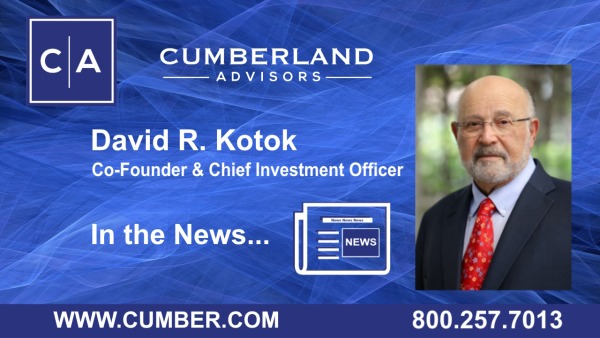David R. Kotok quoted in…
How big banks won the banking crisis
By Nicole Goodkind – CNN – Sept 05, 2023
Excerpt follows:
But what seemed like altruistic acts by large lenders meant to keep the banking system afloat have turned into big wins for some of the world’s largest banks.
Before the Bell spoke with David Kotok of Cumberland Advisors, an investment advisory firm, to discuss what comes next and why he’s staying away from banks right now.
Before the Bell: Now that the dust is hopefully settling on this year’s regional banking crisis, are there clear winners and losers in the banking sector?
David Kotok: There’s no question the [global systemically important banks, G-SIB] won and the middle-sized banks — let’s call that banks with between $50 billion and $250 billion in assets — were the losers.
We know that there’s a proposal for mid-sized banks worth $100 billion or more to have to issue a debt series to shore up their capital, and there’s opposition to it. And we know that there is a movement to rewrite the G-SIB rules [requiring the largest banks to maintain extra capital in case of an emergency]. All these things are currently uncertainties. So you have the uncertainty premium on, I would say, this huge majority of assets in the entire banking system.
I think when you face sequential uncertainty elements which are beyond the control of the normal business cycle, then prudence is to avoid this sector.
UBS just had a gangbusters earnings report after acquiring Credit Suisse and JPMorgan Chase is doing pretty well after it took on First Republic. At the time of the regional banking crisis, JPMorgan Chase CEO Jamie Dimon seemed to be doing a lot to help resolve the crisis and now it appears that his bank is benefiting to an even greater extent than predicted.
JPMorgan is a unique institution. It’s the highest-rated G-SIB bank of the eight in the United States. So, number one, it is in a class by itself. Number two, you could say that has been the case since the banking crisis of 1907 when Mr. J.P. Morgan launched the group to meet at Jekyll Island and create the central bank of the United States, the Federal Reserve. In a way, the role of J.P. Morgan classically in America is being fulfilled again today.
The class of the G-SIB banks, especially JPMorgan Chase, is expected to be an unofficial arm for the purpose of financial stability in the United States. And that has been the case for 100 years. We talk all day long about the Federal Reserve and the dual mandate, unemployment and inflation. But no one talks about the unwritten mandate, financial stability. JPMorgan is a premier institution of the American banking system with a role of assisting for financial stability and that hasn’t changed.
Still, that doesn’t make the banking system stocks attractive right now. Someday, they may be cheap and a really good buy. But they face headwinds right now.
Before the Bell: Is consolidation of regional banks a problem?
David Kotok: Consolidation is a trajectory that has been underway for decades, and will certainly continue, and it will pause. It’s not a linear trajectory, it’s a step function. Every time there’s an issue, there’s consolidation that follows. Then there’s a pause, then there’s another round — and entry for new banks is harder. So if you stand back from the immediate 2023 banking crisis, and you say, how many banks were there 20 years ago in the United States, how many banks are there today? And what has the trend been for half a century? There’s been fewer banks and more concentration, and no matter what the political discussion is, the concentration continues, big gets bigger, and there are fewer players. That hasn’t changed and it is not likely to change.
Links to other websites or electronic media controlled or offered by Third-Parties (non-affiliates of Cumberland Advisors) are provided only as a reference and courtesy to our users. Cumberland Advisors has no control over such websites, does not recommend or endorse any opinions, ideas, products, information, or content of such sites, and makes no warranties as to the accuracy, completeness, reliability or suitability of their content. Cumberland Advisors hereby disclaims liability for any information, materials, products or services posted or offered at any of the Third-Party websites. The Third-Party may have a privacy and/or security policy different from that of Cumberland Advisors. Therefore, please refer to the specific privacy and security policies of the Third-Party when accessing their websites.
Sign up for our FREE Cumberland Market Commentaries
Cumberland Advisors Market Commentaries offer insights and analysis on upcoming, important economic issues that potentially impact global financial markets. Our team shares their thinking on global economic developments, market news and other factors that often influence investment opportunities and strategies.


